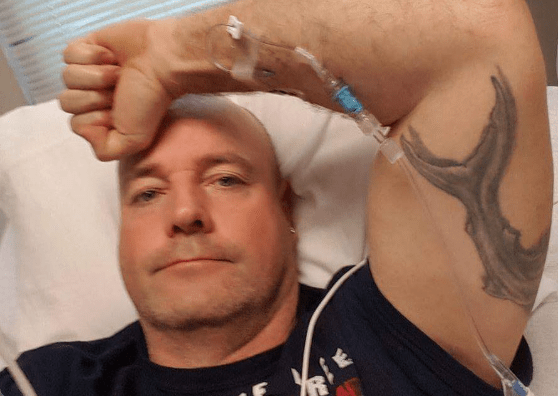For decades, the public has been captivated by John Wayne Bobbitt’s remarkable life, which has been full of extreme highs and lows. His notorious tale started in 1993 when his ex-wife, Lorena Bobbitt, dramatically severed his penis in retaliation. This sparked a string of legal proceedings, a medical miracle, and ultimately his public return. Following surgery, John Wayne Bobbitt’s story is not only one of recuperation but also one of survival, resiliency, and a life reshaped by both adversity and success.

In the nearly nine-hour-long, incredibly complex surgery that saved his life, doctors were able to successfully reattach his severed member. He was given a second chance, both emotionally and physically, by that surgery. Bobbitt’s story kept changing in the years after the reconstructive surgery. He rose to prominence in popular culture by appearing in adult films and even on programs like The Daily Show, demonstrating his courage to face his past head-on. However, beneath the public image, the incident’s trauma persisted, influencing a large portion of his future.
| Key Information about John Wayne Bobbitt | Details |
|---|---|
| Full Name | John Wayne Bobbitt |
| Age | 57 |
| Known For | The 1993 penile mutilation incident, adult films, ministry |
| Surgeries | Reattachment of severed penis, amputation of toes due to neuropathy |
| Current Focus | Personal recovery, legal battles, ministry |
| Past Legal Issues | Trial for marital rape, Lorena Bobbitt trial, and post-surgery controversies |
| Military Service | Former Marine, exposed to contaminated water at Camp Lejeune |
| Health Issues | Peripheral neuropathy, nerve damage, amputation of toes |
| Family | Married once (Lorena Bobbitt), currently single |
From Public Disgrace to Individual Healing
Following surgery, John Wayne Bobbitt’s life has been characterized by an incredibly successful recuperation and a subsequent change in priorities. The seriousness of their situation would have overwhelmed many, but Bobbitt chose a different path. He changed from being a media sensation to a man who was devoted to introspection and personal healing in the years after his recovery. Interestingly, he entered the ministry in 1997 in an effort to change his image and become a more spiritually oriented person. This change demonstrates how adaptable his recuperation was, as he worked to regain his faith and sense of purpose.
But Bobbitt hasn’t had an easy time getting back on his feet. Personal issues persisted, such as a court case and a history of tense relationships. These difficulties highlight the extremely difficult emotional terrain Bobbitt traverses while he deals with the fallout from his horrific past. His story serves as a reminder of the amazing human ability to overcome seemingly insurmountable obstacles, and his resilience is unquestionably powerful.
Life Following Surgery: The Emotional and Physical Path
Bobbitt’s post-surgery journey has been physically challenging. Even though his penis was successfully reattached, the trauma’s neurological effects persisted in his daily life. Bobbitt recently faced additional challenges after learning that he had toxic peripheral polyneuropathy, which resulted in the amputation of his toes. This diagnosis, which resulted from his military service-related exposure to tainted water, was yet another harsh reminder of the numerous hardships he endured.
In an open interview with The Post, Bobbitt likened the trauma of the 1993 incident to having his toes amputated. He reflected on the incident in a very emotional way, saying, “I lost my penis when I was 26 years old.” When that occurred, I didn’t even want to live until the doctor replaced it. The trauma to the toes is not nearly as severe. His extraordinary emotional fortitude is demonstrated by his ability to humorously reinterpret such a profound loss.
The Court Case and His Search for Fairness
Bobbitt’s ongoing legal battles have also had an impact on his life after surgery. Bobbitt is suing the U.S. government in a class-action suit to recover damages for health problems he suffered from exposure to toxic water at Camp Lejeune. The U.S. government has recognized the problem and allocated a sizeable sum for reparations. As he awaits his portion of the money to pay for his medical expenses as well as the psychological effects of his life-altering trauma, Bobbitt’s involvement in this lawsuit demonstrates his tenacious pursuit of justice.
His involvement in this class action brings to light the systemic problems that affect veterans who are exposed to dangerous situations, highlighting the trauma that many service members experience long after their service is over.
Proceeding: Bobbitt’s New Life and His Search for Love
John Wayne Bobbitt is focusing on personal healing and the prospect of falling in love again today. Bobbitt has stated in recent interviews that although he is not in a relationship at the moment, he is still open to the possibility of finding someone who shares his traditional beliefs. His past relationships, such as his turbulent marriage to Lorena, have influenced his perspectives on partnership and love. Bobbitt examines his previous errors and admits that his emotional behavior at the time may have been influenced by his health problems and the toxic exposure.
Bobbitt keeps moving forward in spite of the difficulties and criticism he has encountered from the public. His amazing journey is proof of the human capacity for perseverance, fortitude, and creativity. In addition to being a tale of trauma and survival, John Wayne Bobbitt’s life is also one of a man who has continuously worked to turn personal tragedy into opportunity.
